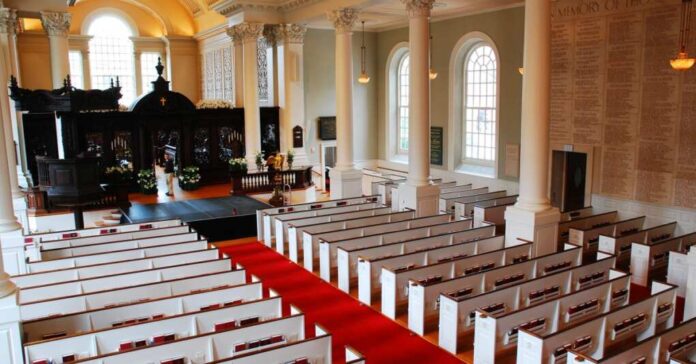
A group of activist clergy in Boston is stirring up controversy once again, this time demanding that white churches in the city pay millions in reparations to its black residents. The Boston People’s Reparations Commission, led by the Rev. Kevin Peterson, held a press conference to push for what they call “public atonement” from churches with historical ties to slavery.
These activists are not holding back, insisting that churches must confess to their past involvement in slavery and cough up the cash. They’ve even gone as far as firing off letters to churches they believe should foot the bill for centuries of discrimination.
The Rev. John Gibbons, speaking on behalf of the commission, pointed fingers at Boston’s colonial churches, claiming they were all founded on the profits of slavery. According to him, colonial ministers were among the most likely to have owned enslaved servants. It’s a bold accusation and one that’s sure to ruffle some feathers.
Edwin Sumpter, another commission member, emphasized the incalculable suffering endured by black Americans throughout history. He stressed that it’s impossible to put a dollar amount on the pain and trauma caused by slavery and its aftermath.
Rev. Kevin Peterson, the driving force behind the commission, didn’t mince words either. He called on white churches in downtown Boston to step up and commit to reparations, urging them not to remain silent on issues of racism and slavery. Peterson emphasized the need for these churches to use their wealth to uplift the black community, suggesting that some of them possess tens of millions of dollars that could be put to better use.
Peterson has a track record of pushing for change in Boston. He’s previously called for the renaming of Faneuil Hall Marketplace due to its ties to slavery, and he successfully secured an apology from the city for its complicity in the slave trade.
Now, the commission is doubling down on its demands, calling on Boston to pay out a whopping $15 billion in reparations to black residents. This includes immediate cash payments, funding for education and anti-crime initiatives, and investment in economic development.
While the commission’s goals may sound noble, their demands raise serious questions. Should churches be held financially responsible for sins committed centuries ago? And can throwing money at the problem truly address the deep-rooted issues of racism and inequality that persist in our society?
It’s a contentious issue that’s unlikely to be resolved anytime soon. But one thing’s for sure: the debate over reparations is far from over, and it’s only heating up in Boston.











